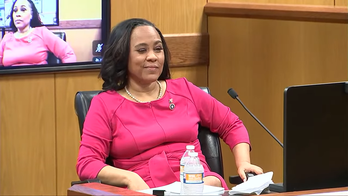The country's most deadly jobs belong to fishermen, pilots, loggers, steel workers, garbage collectors, farmers and electrical power line workers, according to a report by the Bureau of Labor Statistics.
"Member of Congress" doesn't appear on that list. But the 110th Congress, which concludes January 3, will be remembered as one of the deadliest sessions in decades.
Eight lawmakers died in less than two years: seven House members and one senator.
This makes the 110th Congress the deadliest one in 20 years when eight members died between 1987 and 1989. Four suffered heart attacks. Cancer killed three others. One died from complications from AIDS.
Congress had been a healthy place recently.
Only one lawmaker, Rep. Bob Matsui, D-CA, died in the previous two Congresses combined.
Death is often said to be one of the most democratic forces in the universe. Death visited lawmakers of both parties during the 110th Congress. And in a variety of ways.
The new Congress had barely started when Rep. Charlie Norwood, R-GA, died from cancer in February of last year. Just a few days before, President Bush noted Norwood's absence during his State of the Union address.
Rep. Juanita Millender-McDonald, D-CA, followed Norwood in death in April. With Democrats just seizing control of the House, Millender-McDonald had become chair of the House Administration Committee.
Millender-McDonald's death marked the first of three House committee chairs to expire this Congress. House Foreign Affairs Committee Chairman Tom Lantos, D-CA, died this past February, a little more than a month after announcing he wouldn't run for a 15th term.
Jewish and a native of Hungary, Lantos twice escaped Nazi labor camps and worked in the anti-Nazi underground.
He survived the Holocaust. But could not survive esophageal cancer.
Bono performed at a moving memorial service in Lantos' honor in Statuary Hall of the Capitol.
Rep. Stephanie Tubbs Jones, D-OH, chaired the House Ethics Committee when she died in August. Police discovered the congresswoman unconscious in her car in suburban Cleveland after suffering a cerebral hemorrhage.
Mark Twain famously declared that reports of his death were "greatly exaggerated." The same could have been said briefly for Tubbs Jones.
Around midday on August 20, hundreds of news outlets including CNN, The New York Times, NPR and FOX News, reported that the congresswoman had died. The Cleveland Plain Dealer even wrote she died at "12:32 p.m." But a doctor at the hospital later announced that Tubbs Jones remained in critical condition.
Tubbs Jones finally died later that evening.
Breast cancer killed Rep. Jo Ann Davis, R-VA, in October, 2007. Davis was only the second woman elected to Congress from Virginia.
Last December, Rep. Julia Carson, D-IN, succumbed to lung cancer. Elected in 1996, Carson struggled with her health during her years on Capitol Hill. She had a heart attack shortly after her first election and underwent double bypass surgery. She took her oath of office for Congress from her hospital bed in January, 1997.
The most bizarre death came in September, 2007 when Rep. Paul Gillmor, R-OH, died after a fall at his townhouse in Arlington, VA. Gillmor's aides became worried after the congressman missed a staff meeting and a morning hearing.
After they couldn't reach the Ohio Republican by phone, his alarmed chief of staff, Mark Wellman, and his press secretary, Brad Mascho, drove to Gillmor's house. Mascho said later he knew things were fine if they arrived at the home and “his car is gone."
Wellman and Mascho used a spare key to enter Gillmor's house. And that's where they discovered the congressman's body at the bottom of a flight of carpeted stairs.
One senator passed away this Congress: Sen. Craig Thomas, R-WY. Shortly before his re-election to a third term in November 2006, Thomas fought pneumonia and was then diagnosed with leukemia.
But Thomas was determined to return to work soon. Known for his 5 a.m. runs, the senator alarmed nurses when he they discovered him on the floor of his hospital room one day while still undergoing chemotherapy. Thomas was doing push-ups.
Thomas came back to Capitol Hill and lawmakers remarked at how good he looked. But a second bout killed the senator in June, 2007.
The next day, a bouquet of flowers adorned Thomas' desk toward the rear of the Senate chamber. When Senate Majority Leader Harry Reid, D-NV, opened session the next day, he remarked that the Senate is a “small family."
“We are just 100 people," Reid said, pausing for a moment. “Ninety-nine today."
Later on the floor, Sen. John Warner, R-VA, reminisced about conversations he often shared with Thomas about fishing.
Warner said Thomas once confided in him about a small stream in an untouched, pristine part of Wyoming that few people even know about. Thomas invited Warner to accompany him on a fishing trip there sometime and promised it would be an adventure “you'll never forget."
Wistfully, Warner shook his head and admitted to the Senate that he had “missed that trip."
Eight lawmakers. All gone. In one of deadliest sessions of Congress on record.
FOX News' Chad Pergram has won an Edward R. Murrow Award and the Joan Barone Award for his reporting on Capitol Hill.




